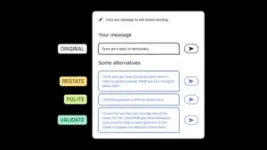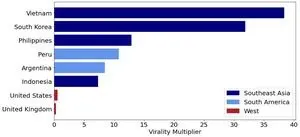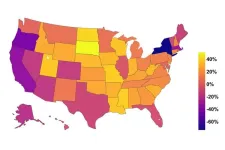(Press-News.org) Check the comments section of many social media and digital news platforms, and you’re likely to find a cesspool of insults, threats and even harassment. In fact, a Pew Research Center survey found that 41% of American adults have personally experienced online harassment, and one in five adults say they’ve been harassed online for their political views.
But researchers at BYU and Duke University say derisive online conversations don’t have to be the norm. A joint paper between the two universities found that artificial intelligence can be used to improve conversation quality and promote civil dialogue in online interactions.
Using a specially developed online platform built by BYU undergraduate Vin Howe, the researchers conducted a distinctive experiment. They paired participants with opposing viewpoints in an online chat and asked them to discuss a highly polarizing topic in American politics: gun control. During the conversation, one user would intermittently receive a prompt from an AI tool suggesting a rephrasing of their message to make it more polite or friendly but without altering its content. Participants had the freedom to adopt, modify or dismiss the AI tool’s suggestion. When the chat concluded, participants were directed to a survey to assess the quality of the conversation.
Over 1,500 individuals participated in the experiment, leading to a total of 2,742 AI-generated rephrasings being accepted by participants. The results revealed a promising transformation in the dynamics of online interactions. Chat partners of individuals who implemented one or more AI rephrasing suggestions reported significantly higher conversation quality and, remarkably, exhibited greater willingness to listen to the perspectives of their political opponent.
“We found the more often the rephrasings were used, the more likely participants were to feel like the conversation wasn’t divisive and that they felt heard and understood,” said BYU computer science professor David Wingate, a co-author on the study who is helping launch BYU’s degree in computer science with an emphasis in machine learning this fall.
Importantly, AI-assisted rephrasings didn’t alter the content of the conversations, nor did they change the viewpoints of the participants, said Wingate, who noted that AI chat assistance is vastly different from persuasive AI, which is dangerous and ethically fraught. “But helping people have productive and courteous conversations is one positive outcome of AI.”
The implications of the research are far-reaching, since it offers a scalable solution to combat toxic online culture that has plagued the internet for years. Unlike traditional methods, such as professional training sessions led by expert moderators that are limited in scope and availability, AI intervention can be broadly implemented across various digital channels.
By properly utilizing the power of AI, online platforms could be transformed into constructive forums where individuals from differing backgrounds and opinions come together to discuss current issues with empathy and respect. Ultimately, this research shows that AI technology, when thoughtfully integrated, can play a pivotal role in shaping a more positive online landscape.
“My hope is that we’ll continue to have more BYU students build pro-social applications like this and that BYU can become a leader in demonstrating ethical ways of using machine learning,” said Wingate. “In a world that is dominated by information, we need students who can go out and wrangle the world’s information in positive and socially productive ways.”
The study was recently published in the scientific journal PNAS by Wingate and BYU professors Lisa Argyle, Ethan Busby and Josh Gubler, as well as professor Chris Bail from Duke University. Former BYU graduate students Chris Rytting and Taylor Sorensen also co-authored the study.
END
AI helps reduce online harassment by enhancing conversation courtesy
Researchers at BYU and Duke harness AI to foster empathetic discourse and combat online harassment, paving the way for a kinder digital landscape
2023-10-05
ELSE PRESS RELEASES FROM THIS DATE:
Two-day course teaches hospitals and health systems how to address unprofessionalism and unsafe behavior
2023-10-05
With a myriad of external pressures and challenges facing hospitals and health systems today, it is more important now than ever to mitigate internal risks. Unprofessional behavior, which negatively impacts patient care, retention, and team dynamics, is a legal, financial, and cultural risk that many health systems are now looking to address head-on. Peer-reviewed research consistently shows unprofessional behavior in health systems can be reduced by 85% through implementing the right tools and processes.
The Vanderbilt ...
Study highlights use of TikTok to encourage cervical cancer screening
2023-10-05
TikTok and other short-form video platforms are booming in popularity — for entertainment and for sharing information, including health information.
Researchers are currently examining the effects of social media videos, and among them is Ciera Kirkpatrick, assistant professor of advertising and public relations at the University of Nebraska–Lincoln. Kirkpatrick, who studies the intersection of communication and health, recently turned her scientific eye toward TikTok.
In a newly published article, Kirkpatrick and co-author LaRissa Lawrie, a doctoral ...
K-pop fans helped COVID-19 public health messaging go viral
2023-10-05
Three years ago, as part of the public health messaging in response to the COVID-19 pandemic, the World Health Organization launched the "Wear A Mask" campaign on social media.
However, despite their benefits to public health, mask-wearing quickly became a highly politicized and divisive issue across the globe.
But the campaign gained impressive traction after World Health Organization Director-General Tedros Adhanom Ghebreyesus issued the following tweet on X, the social media platform known at the time as Twitter, on August 21, 2020, thanking BTS, a South Korean K-pop group, for supporting the mask-wearing public ...
Physicists find evidence for magnetically bound excitons
2023-10-05
In art, the negative space in a painting can be just as important as the painting itself. Something similar is true in insulating materials, where the empty spaces left behind by missing electrons play a crucial role in determining the material's properties. When a negatively charged electron is excited by light, it leaves behind a positive hole. Because the hole and the electron are oppositely charged, they are attracted to each other and form a bond. The resulting pair, which is short lived, is known as an exciton [pronounced exit-tawn].
Excitons are a key part of many technologies, including solar panels, photodetectors and sensors, as well as light-emitting ...
Dr. Julie Damp named ACC Annual Scientific Session Vice Chair
2023-10-05
The American College of Cardiology has announced Julie Damp, MD, FACC, as the next vice chair of the American College of Cardiology’s Annual Scientific Session. Damp will serve as vice chair for ACC.25 and ACC.26 and transition to chair for ACC.27 and ACC.28.
"ACC Annual Scientific Session is an incredibly impactful learning experience for cardiovascular care providers globally,” Damp said. “I am truly honored and excited to have the opportunity to work with the ACC team to provide effective and innovative education that impacts the care of our patients and expands the reach of cardiovascular science."
Damp is a professor of medicine in cardiovascular medicine ...
New research may make future design of nanotechnology safer with fewer side effects
2023-10-05
A new study may offer a strategy that mitigates negative side effects associated with intravenous injection of nanoparticles commonly used in medicine.
The study was published today in Nature Nanotechnology.
“Nanotechnology’s main advantage over conventional medical treatments is its ability to more precisely target tissues, such as cancer cells targeted by chemotherapy. However, when nanoparticles are injected, they can activate part of the immune system called complement,” said senior author Dmitri Simberg, Ph.D., professor of Nanomedicine and Nanosafety at the University of Colorado Skaggs School of Pharmacy ...
Climate intervention technologies may create winners and losers in world food supply
2023-10-05
A technology being studied to curb climate change – one that could be put in place in one or two decades if work on the technology began now – would affect food productivity in parts of planet Earth in dramatically different ways, benefiting some areas, and adversely affecting others, according to projections prepared by a Rutgers-led team of scientists.
Writing in the journal, Nature Food, the scientists described the results of computer models simulating varying climate scenarios and their impacts over time on the production of the world’s four major food crops: ...
Racial and ethnic disparities in glycemic control among insured adults
2023-10-05
About The Study: In this study of 4,070 insured adults with diabetes, disparities in poor glycemic control persisted despite adjustment for social, health care, and behavioral factors. Research is needed to identify the barriers contributing to poor control even in populations with access to care.
Authors: Sandra S. Albrecht, Ph.D., M.P.H., of the Columbia University Mailman School of Public Health in New York, is the corresponding author.
To access the embargoed study: Visit our For The Media website at this link https://media.jamanetwork.com/
(doi:10.1001/jamanetworkopen.2023.36307)
Editor’s Note: Please see the article ...
Changes in cannabis-attributable hospitalizations following nonmedical cannabis legalization in Canada
2023-10-05
About The Study: This study of 26.9 million individuals in four Canadian provinces found that cannabis legalization with restrictions was not associated with an increase in hospitalizations due to cannabis but commercialization was. The findings suggest that commercialization of cannabis may be associated with increases in cannabis-related health harms, including cannabis-induced psychosis.
Authors: Daniel T. Myran, M.D., M.P.H., of the Ottawa Hospital Research Institute in Ottawa, Ontario, Canada, is the corresponding author.
To ...
Generative AI for chest radiograph interpretation in the emergency department
2023-10-05
About The Study: In a representative sample of emergency department chest radiographs, results suggest that the generative artificial intelligence (AI) model produced reports of similar clinical accuracy and textual quality to radiologist reports while providing higher textual quality than teleradiologist reports. Implementation of the model in the clinical workflow could enable timely alerts to life-threatening pathology while aiding imaging interpretation and documentation.
Authors: Mozziyar Etemadi, M.D., Ph.D., of Northwestern Medicine ...
LAST 30 PRESS RELEASES:
Brainwaves of mothers and children synchronize when playing together – even in an acquired language
A holiday to better recovery
Cal Poly’s fifth Climate Solutions Now conference to take place Feb. 23-27
Mask-wearing during COVID-19 linked to reduced air pollution–triggered heart attack risk in Japan
Achieving cross-coupling reactions of fatty amide reduction radicals via iridium-photorelay catalysis and other strategies
Shorter may be sweeter: Study finds 15-second health ads can curb junk food cravings
Family relationships identified in Stone Age graves on Gotland
Effectiveness of exercise to ease osteoarthritis symptoms likely minimal and transient
Cost of copper must rise double to meet basic copper needs
A gel for wounds that won’t heal
Iron, carbon, and the art of toxic cleanup
Organic soil amendments work together to help sandy soils hold water longer, study finds
Hidden carbon in mangrove soils may play a larger role in climate regulation than previously thought
Weight-loss wonder pills prompt scrutiny of key ingredient
Nonprofit leader Diane Dodge to receive 2026 Penn Nursing Renfield Foundation Award for Global Women’s Health
Maternal smoking during pregnancy may be linked to higher blood pressure in children, NIH study finds
New Lund model aims to shorten the path to life-saving cell and gene therapies
Researchers create ultra-stretchable, liquid-repellent materials via laser ablation
Combining AI with OCT shows potential for detecting lipid-rich plaques in coronary arteries
SeaCast revolutionizes Mediterranean Sea forecasting with AI-powered speed and accuracy
JMIR Publications’ JMIR Bioinformatics and Biotechnology invites submissions on Bridging Data, AI, and Innovation to Transform Health
Honey bees navigate more precisely than previously thought
Air pollution may directly contribute to Alzheimer’s disease
Study finds early imaging after pediatric UTIs may do more harm than good
UC San Diego Health joins national research for maternal-fetal care
New biomarker predicts chemotherapy response in triple-negative breast cancer
Treatment algorithms featured in Brain Trauma Foundation’s update of guidelines for care of patients with penetrating traumatic brain injury
Over 40% of musicians experience tinnitus; hearing loss and hyperacusis also significantly elevated
Artificial intelligence predicts colorectal cancer risk in ulcerative colitis patients
Mayo Clinic installs first magnetic nanoparticle hyperthermia system for cancer research in the US
[Press-News.org] AI helps reduce online harassment by enhancing conversation courtesyResearchers at BYU and Duke harness AI to foster empathetic discourse and combat online harassment, paving the way for a kinder digital landscape





